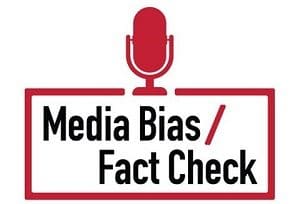LEFT-CENTER BIAS
These media sources have a slight to moderate liberal bias. They often publish factual information that utilizes loaded words (wording that attempts to influence an audience by appeals to emotion or stereotypes) to favor liberal causes. These sources are generally trustworthy for information but may require further investigation. See all Left-Center sources.
- Overall, we rate the BBC Left-Center biased based on story selection that slightly favors the left. We also rate them High for factual reporting due to proper sourcing of information. Although they have failed a fact-check, they appropriately issued a correction.
Detailed Report
Bias Rating: LEFT-CENTER
Factual Reporting: HIGH
Country: United Kingdom
MBFC’s Country Freedom Rank: MOSTLY FREE
Media Type: TV Station
Traffic/Popularity: High Traffic
MBFC Credibility Rating: HIGH CREDIBILITY
History
Founded in 1922 by John Reith, The British Broadcasting Company is Britain’s public broadcaster. The company later became the British Broadcasting Corporation. The British Broadcasting Company (BBC) began its daily radio transmissions in 1922. The BBC currently provides television, radio, and online services throughout Britain and overseas and is headquartered in the Broadcasting House, London, United Kingdom.
The BBC began the world’s first regular television service in 1932. TV broadcasting was suspended during the Second World War, and BBC radio was an important source for news and entertainment. The BBC held a monopoly on television in Great Britain until 1954 and on radio until 1972.
Read our profile on United Kingdom Government and Media.
Funded by / Ownership
The BBC operates under a Royal Charter, which is renewed every 10 years. The Royal Charter abolished the BBC Trust, and the regulatory functions of the BBC Trust were transferred to The Office of Communications or Ofcom in 2017. The operations of the BBC are governed by a board of directors consisting of thirteen people. Currently, the former Deputy Governor of the Bank of England, David Clementi, is the Chairman of the BBC, and Tony Hall is the Director-General of the BBC (Editor-in-Chief ). The BBC is financed by consumer license fees on broadcasting receivers (1947 Wireless and Telegraphy Act), which enables BBC’s UK services to be free of advertisements and independent of shareholder and political interests.
Analysis
In review, both sides of the political spectrum have accused the BBC of having a liberal or conservative bias. For example, an Evening Standard article based on an interview with a former BBC employee describes the BBC as a “Nest of Lefties promoting a progressive agenda and political correctness.” According to a Times of London article, the BBC is biased against Israel; therefore, it has a left bias. The BBC states in its editorial guidelines that they are impartial and free from both political and commercial influence.
The BBC also has an Executive Complaints Unit in which the Daily Mail published an article regarding how the complaints unit works. The article states, “There was also a sharp increase in political bias and religious prejudice accusations.” The BBC then responded to the Daily Mail article: “The Mail also said that the figures ‘showed the level of dissatisfaction over issues such as left-wing bias, offensive content, and inaccuracy’. In fact, there is an extensive range of reasons why people complain. For example, we often get complaints of ‘bias’ about the same program from two or more opposing sides of the many issues we cover, not just ‘left-wing’”.
Bias
According to New Statesman’s research, examining the impartiality of the BBC’s reporting shows that they lean right in certain areas, such as business, immigration, and religion. Examples of right bias include the BBC being accused of doctoring Jeremy Corbyn’s image, who serves as Leader of the Labour Party (Corbyn identifies as a democratic socialist) wearing a Russian-style cap in front of a Moscow skyline to make him look more Russian. BBC rejected the complaints by claiming the decision to publish Corbyn in a “Lenin-style cap in front of the Moscow skyline was not designed to convey an impression of pro-Russian sympathy on Corbyn’s part but was in keeping with an editorial decision made based on sound news judgment.”
A 2014 Pew Research Survey found that 60% of BBC’s audience is consistently or primarily liberal, 26% is mixed, and 13% is consistently or mostly conservative. This indicates that a more liberal audience prefers BBC News. Further, a Reuters Institute survey found that 62% of respondents trust their news coverage and 21% do not, ranking them #1 in trust of the major UK news providers.
When reporting general news, the BBC always sources its information and uses minimal loaded words in headlines such as this: Trump chief of staff John Kelly to leave White House job. When it comes to reporting on the USA and, in particular, former President Donald Trump, there is a negative tone directed at Trump and his policies. In general, the BBC covers both sides of stories, with a slight bias in favor of the left.
Failed Fact Checks
- A group of puppies transported more than 100 miles died with Covid-19. – False (Corrected)
Overall, we rate the BBC Left-Center biased based on story selection that slightly favors the left. We also rate them High for factual reporting due to proper sourcing of information. Although they have failed a fact-check, they appropriately issued a correction. (5/15/2016) Updated (M. Huitsing 12/02/2023)
Source: https://www.bbc.com/news
Last Updated on December 2, 2023 by Media Bias Fact Check
Do you appreciate our work? Please consider one of the following ways to sustain us.
or
Left vs. Right Bias: How we rate the bias of media sources


